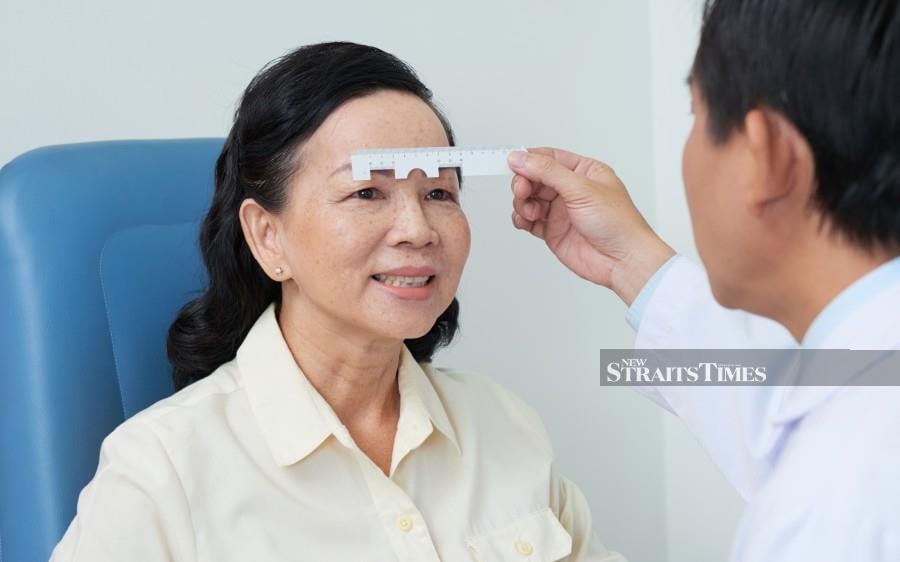EYE care is probably one of the most neglected parts of self-care when it comes to regular check-ups. Even on a daily basis, how often have you touched your eyes and face with unwashed hands?
And when it comes to annual medical reviews, how often have you been more concerned with stress tests and sugar levels than your eyes? Perhaps you may just go to the optometrist to see if your prescription glasses or contact lenses need a change. But that isn't enough and doesn't really count as a full eye health checkup.
A full eye test comprises an examination of the internal and external structure of your eyes to detect conditions like glaucoma, cataracts and macular degeneration. During this time, your eye doctor would conduct a series of tests to evaluate your vision and check for diseases.
Before he/she sees you, a clinical assistant will prepare you by taking your medical history, measuring your eye pressure and giving you eye drops to dilate your eyes. There'll be tests to check your vision and function of your eyes.
I remember the years of accompanying my late parents for their eye check-ups. Each session lasted more than an hour, depending on what they found and if immediate treatments were required.
When the eyes are dilated, they're very sensitive to light. Even the regular lighting in the room may be too bright for them. So, remember to bring along some dark glasses.
If it's your own check-up, get someone to accompany you. At the very least, you need transport to take you to the clinic and back because you won't be able to drive well after the check-up. You may be a danger not just to yourself, but also others on the road.
UNDERSTANDING EYE PROBLEMS
My parents had different eye problems and diseases. Dad had macular degeneration, and mum had glaucoma, cataracts and diabetic retinopathy. Each needed different types of treatment, but both were declared legally blind towards the end of their lives.
Their type of "blindness" wasn't total darkness. Dad had some periphery vision. He could still see things if he angled his head in a certain way. So, he could still recognise people and even watch television, but had to totally give up driving. Macular degeneration blacks out your central vision, but leaves some peripheral vision where you may still see.
Mum, however, could only see shadows. At the time her eyes went really bad, she could barely make out our shapes. She could only tell who was there with her by their voice and smell, and of course, if you told her who you were.
My parents' afflictions haunted me for years, even after their passing. I'd often wish for them to receive some help somehow, and for some miraculous medical breakthroughs. Deep down, I was also terrified that I might suffer their fate when I reach their age.
Then, just recently, I attended a talk on eye health and learnt that there's treatment and medicines for people with eye problems like my parents!
The medical advancements from those days nearly 20 years ago are phenomenal. What my parents would have given to have their eyesight restored, or at least managed so that they didn't lose it.
DON'T WAIT
Surgery for cataracts have now advanced and there's reduced procedure time. You can choose several different types of lenses too. With proper examination and discussion with your doctor, your eyes may even be better than before.
There are medicines and injections now that can help macular degeneration from progressing. Likewise, there are procedures like installing a shunt that can help release the pressure in your eyeballs to prevent vision loss caused by glaucoma.
What you need now is the courage and time to get your eyes examined. Getting them checked helps detect eye problems at their earliest stage when they're most treatable. As a rule, if you're healthy and have no symptoms of vision problems, the American Academy of Ophthalmology recommends having a complete eye exam at the age of 40, when some vision changes and eye diseases are likely to start.
If you're 60 or older, you may want to have your eyes checked every year or two, especially if you wear glasses or contact lenses; have a family history of eye disease or loss of vision; have chronic disease that puts you at greater risk of eye disease such as diabetes; and/or take medications that have serious side effects for the eyes.
Eye diseases occur over time, and is often painless and without symptoms. Before you know it, it might be too late for your doctor to help you. Don't wait for something to happen or for some symptoms or pain.
(The views expressed in this article are the writer's own)
Putri Juneita Johari volunteers for the Special Community Society of Ampang. She can be reached at [email protected].





